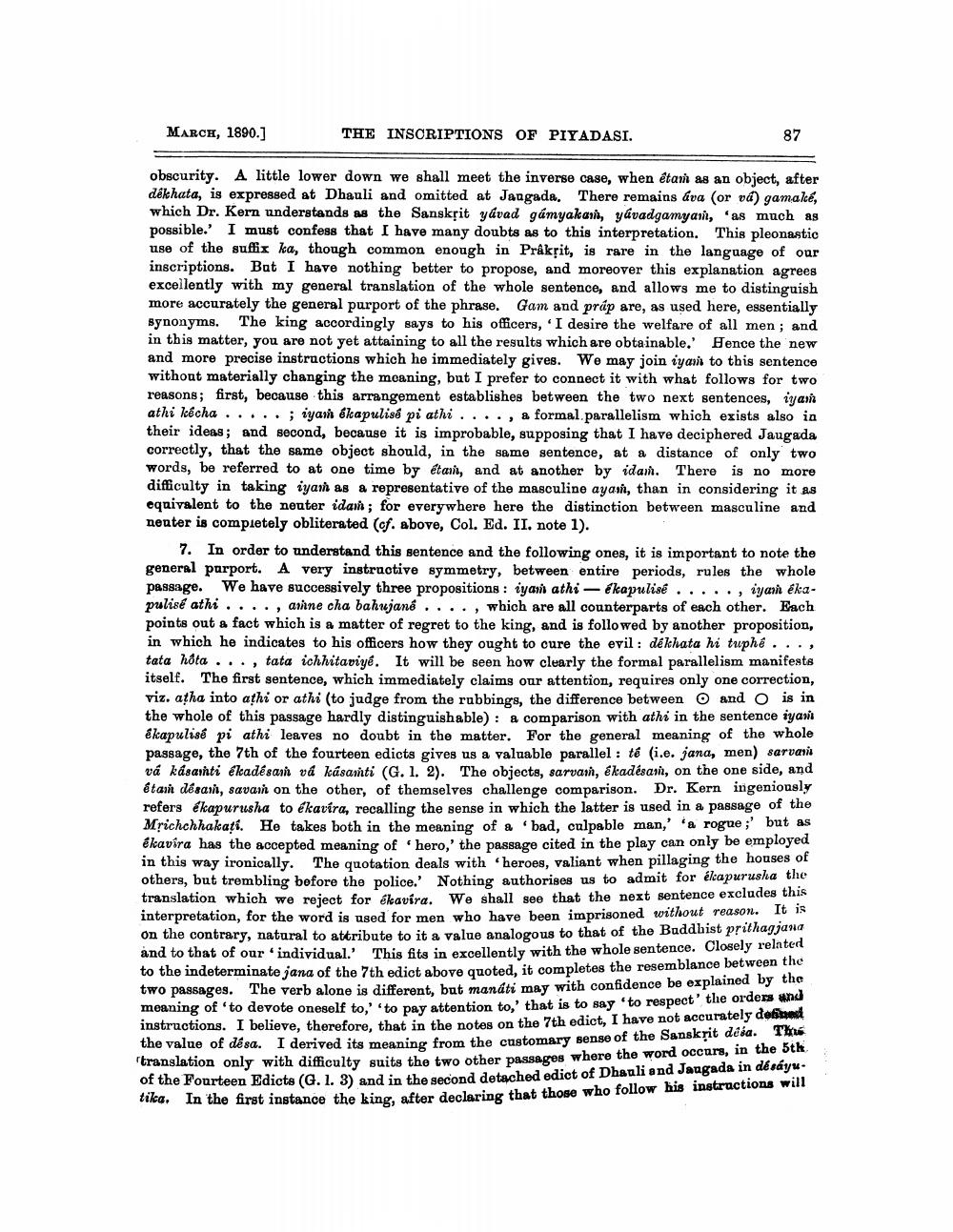________________
MARCH, 1890.]
THE INSCRIPTIONS OF PIYADASI.
87
obscurity. A little lower down we shall meet the inverse case, when étan as an object, after dékhata, is expressed at Dhauli and omitted at Jangada. There remains kva (or va gamale, which Dr. Kern understands as the Sanskrit yávad gámyakara, yávadgamyan, 'as much as possible.' I must confess that I have many doubts as to this interpretation. This pleonastic use of the suffix ka, though common enough in Prakrit, is rare in the language of our inscriptions. But I have nothing better to propose, and moreover this explanation agrees excellently with my general translation of the whole sentence, and allows me to distinguish more accurately the general purport of the phrase. Gam and práp are, as used here, essentially synonyms. The king accordingly says to his officers, 'I desire the welfare of all men; and in this matter, you are not yet attaining to all the results which are obtainable. Hence the new and more precise instructions which he immediately gives. We may join iyarn to this sentence without materially changing the moaning, but I prefer to connect it with what follows for two reasons; first, because this arrangement establishes between the two next sentences, iyasi athi kecha ..... ; iyan ékapulisé pi athi ...., a formal parallelism which exists also in their ideas; and second, because it is improbable, supposing that I have deciphered Jaugada correctly, that the same object should, in the same sentence, at a distance of only two words, be referred to at one time by étain, and at another by idarn. There is no more difficulty in taking iyan as a representative of the masculine ayan, than in considering it as equivalent to the neuter idan; for everywhere here the distinction between masculine and neuter is completely obliterated (cf. above, Col. Ed. II, note 1).
7. In order to understand this sentence and the following ones, it is important to note the general parport. A very instructive symmetry, between entire periods, rules the whole passage. We have successively three propositions : iyan athi - ékapulise ....., iyan ékapulisé athi ...., arine cha bahujano ...., which are all counterparts of each other. Each points out a fact which is a matter of regret to the king, and is followed by another proposition, in which he indicates to his officers how they ought to cure the evil : dékhata hi trphé..., tata hôta ..., tata ichhitaviyê. It will be seen how clearly the formal parallelism manifests itself. The first sentence, which immediately claims our attention, requires only one correction, viz. atha into athi or athi (to judge from the rubbings, the difference between 0 and O is in the whole of this passage hardly distinguishable): a comparison with athi in the sentence iyani ékapulisé pi athi leaves no doubt in the matter. For the general meaning of the whole passage, the 7th of the fourteen edicts gives us a valuable parallel : tê (i.e. jana, men) sarvari vá kásainti ékadé sanh và kásanti (G. 1. 2). The objects, sarvan, ékadésari, on the one side, and éta désan, savain on the other, of themselves challenge comparison. Dr. Kern ingeniously refers @kapurusha to kavira, recalling the sense in which the latter is used in a passage of the Mrichchhakati. He takes both in the meaning of a bad, culpable man,' 'a rogue ;' but as ékavira has the accepted meaning of hero,' the passage cited in the play can only be employed in this way ironically. The quotation deals with heroes, valiant when pillaging the houses of others, but trembling bofore the police. Nothing authorises us to admit for ékapurusha the translation which we reject for élavira. We shall see that the next sentence excludes this interpretation, for the word is used for men who have been imprisoned without reason. 10 on the contrary, natural to attribute to it a value analogous to that of the Buddbist Prindgjum and to that of our individual.' This fits in excellently with the whole sentence. Closely relatert to the indeterminate jana of the 7th edict above quoted, it completes the resemblance between the two passages. The verb alone is different. but manáti may with confidence be explained by the moaning of 'to devote oneself to.' 'to pay attention to,' that is to say 'to respect' the orders wid instructions. I believe, therefore, that in the notes on the 7th edict, I have not accurately define
T'A the value of desa. I derived its meaning from the customary sense of the Sanskrit desa. translation only with difficulty suits the two other passages where the the Fourteen Edicts (G. 1. 3) and in the second detached edict of Dhauli and Jaugada in desayu.
In the first instance the king, after declaring that those who follow his instructions will




